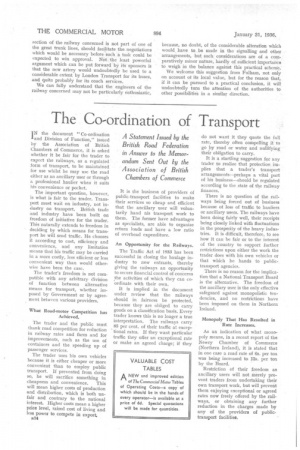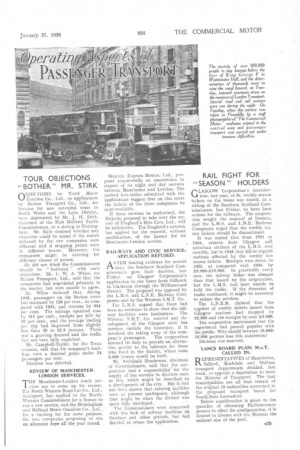The Co-ordination of Transport
Page 44

Page 45

If you've noticed an error in this article please click here to report it so we can fix it.
IN the document "Co-ordination land Division of Function," issued by the Association of British Chambers of Commerce, it is asked whether it be fair for the trader to expect the railways, as a regulated form of transport, to be maintained for use whilst he may use the road either as an ancillary user or through a professional haulier when it suits his convenience or pocket.
The important question, however, is what is fair to the trader. Transport must wait on industry, not industry on transport. British trade and industry have been built on freedom of initiative for the trader. This naturally extends to freedom in deciding by which means for transport he will send traffic. He chooses it according to cost, efficiency and convenience, and any limitation means that his traffic may be carried in a more costly, less efficient or less convenient way than would otherwise have been the case.
The trader's freedom is not compatible with any arbitrary division of function between alternative means for transport, whether imposed by Government or by agreement between various providers.
What Road-motor Competition has Achieved.
The trader and the public must thank road competition for reduction in railway rates and fares and for improvements, such as the use of containers and the speeding up of passenger services.
The trader uses his own vehicles because it is either cheaper or more convenient than to employ public transport. If prevented from doing so, he will sacrifice something in cheapness and convenience. This will mean higher costs of production and distribution, which is both unfair and contrary to the national interest. Higher costs mean a higher price level, raised cost of living and less power to compete in export. It is the business of providers of public-transport facilities to make their services so cheap and efficient that the ancillary user will voluntarily hand his transport work to them. The former have advantages as specialists, are able to organize return loads and have a low ratio of overhead expenditure.
An Opportunity for the Railways.
The Traffic Act of 1933 has been successful in closing the haulage industry to new entrants, thereby giving the railways an opportunity to secure financial control of coneerns the activities of which they can coordinate with their own.
It is implied in the document under review that the railways should in fairness be protected, because they are obliged to carry goods on a classification basis. Every trader knows this is no longer a true interpretation. The railways carry 85 per cent. of their traffic at exceptional rates. If they want particular traffic they offer an exceptional rate or make an agreed charge; if they do not want it they quote the full rate, thereby often compelling it to go by road or water and nullifying their obligation to carry.
It is a startling suggestion for any trader to realize that protection implies that a trader's transport arrangements--perhaps a vital part of his business—should be regulated according to the state of the railway finances.
There is no question of the railways being forced out of business because of loss of traffic to hauliers or ancillary users. The railways have been doing fairly well, their receipts being closely linked with fluctuations in the prosperity of the heavy industries. It is difficult, therefore, to see how it can be fair or to the interest of the country to support further restrictions upon either the work the trader does with his own vehicles or that which he hands to publictransport agencies.
There is no reason for the implication that a National Transport Board is the alternative. The freedom of the ancillary user is the only effective safeguard against monopolistic tendencies, and no restrictions have been imposed on them in Northern Ireland.
Monopoly That Has Resulted in Rate Increases.
As an indication of what monopoly means, in a recent report of the Newry Chamber of Commerce (Northern Ireland), it is stated that in one case a road rate of 6s. per ton was being increased to 13s. per ton by the Board.
Restriction of their freedom as ancillary users will not merely prevent traders from undertaking their own transport work, but will prevent them enjoying exceptional or agreed rates now freely offered by the railways, or obtaining any further reduction in the charges made by any of the providers of publictransport facilities.
TOUR OBJECTIONS " BOTHER " MR. STIRK
OBJECTIONS by Trent Motor Traction Co., Ltd., to applications by Barton Transport Co., Ltd., for licences for new extended tours to North Wales and the Lake District, were deprecated, by ,Mr. J. H. Stirk, chairman of the East Midland Traffic Commissioners, at a sitting in Nottingham. Mr. Stirk doubted whether any objection could be raised if the routes followed by the two companies were different and if stopping points were in different towns. Moreover, the companies might be catering for different classes of person.
He did not think the Commissioners should be " bothered " with such objections. Mr. L. W. A. White, for Barton Transport, Ltd., said that the companies had negotiated privately, in the matter, but were unable to agree.
Mr. White declared that, during 1935, passengers on the Barton tours had increased by 128 per cent., as compared with 1934, and revenue by 354 per cent. The mileage operated rase by 311 per cent., receipts per mile by 20 per cent., and the average loading per trip had improved from slightly less than 20 to 22.3 persons. There was a growing demand and the traffic had not been fully exploited.
Mr. Campbell-Taylor, for the Trent concern, said that his company's loadings were a decimal point under 24 passengers per tour.
Decision was deferred.
REVIEW OF MANCHESTER. LONDON SERVICES.
THE Manchester-London coach services are to come up for review. The North Western Road Car Co.. Ltd., Stockport, has applied to the NorthWestern Commissioners for a licence to tun a new service, and the Birmingham and Midland Motor Omnibus Co., Ltd., for a backing for the same purpose, the two companies proposing to run on alternate days all the year round.
Majestic Express Motors, Ltd., proposes concurrently an emendation in respect of its night and day services between Manchester and London. The revised fare-tables submitted with the applications suggest that on this route the tickets of the three companies be inter-available.
If these services be authorized, the Majestic proposal to take over the service of Fingland's Hire Cars, Ltd., will be withdrawn. The Fingland's concern has applied for the renewal, without modification, of the licence for its Manchester-London service.
RAILWAYS AND CIVIC SERVICE: APPLICATION REFUSED.
AFTER hearing evidence for several days, the Southern Scotland Cornmissioeers gave their decision, last Friday, on Glasgow Corporation's application to run buses from Giffnock to Clarks Ion, through the Williamwood district. The proposal was opposed by the L.M.S. and L.N,E. Railway Companies and by the Western S.M.T. Co.
The L.M.S. argued that there had been no evidence to show that the railway facilities were inadequate. The Western S.M.T. Co. resisted any development of the Glasgow civic bus services outside the boundary, if it involved the taking away of the com pany's passengers. The corporation stressed its duty to provide an alternative service to the railways for those who lived in the district, where some 2,000 houses would be built, Mr. Archibald Henderson, chairman of Commissioners, said that the corporation had a responsibility' for the supply of bus services in districts such as this, which might be described as a development of the city. But it had not been shown that existing facilities were at present inadequate, although they might be when the district was more fully developed.
The Commissioners were concerned eVith the lack of railway facilities Oh Sundays and Other periods, but had decided to refuse the application.
RAIL FIGHT FOR "SEASON" HOLDERS
LASGOW Corporation's introduction, last year, of 3s. weekly season tickets on the buses was stated, at a sitting of the Southern Scotland Commissioners. last Friday, to have been serious for the railways. The corporation sought the renewal of lic.ences, and the L.M.S. and L.N.E. 'Railway Companies urged that the weekly sea son tickets should be discontinued.
It was stated that from 1931 to 1934, returns from Glasgow ana suburban stations of the L.M.S. rose steadily, but in 1935 they fell as regards stations affected by the weekly bus season tickets. Receipts were down, in 1935, as compared with 1934, by E9 ,000-R,10, 000. In practically every case, the railway ticket was cheaper than that issued by the corporation. but the L.M.S. had been unable to hold the traffic. If the diversion of traffic continued, it might be necessary to reduce the services.
The L.N.E.R. claimed that the number of weekly tickets issued from Glasgow stations had dropped by 32,000 and the receipts by over £3,000.
The corporation maintained that the experiment had proved popular with the public. Why should between 15.00016,000 persons lose this concession?
Decision was reserved.
LANCS BOARD PLAN: M.o.T. CALLED IN.
REPRESENTATIVES of Manchester, Salford, Rochdale and Oldham transport departments decided, last week, to appoint a deputation to meet the Minister of Transport. The four municipalities are all that remain of the original 10 authorities concerned in the proposed transport board for South-East Lancashire.
Before consideration is given to the question of obtaining Parliamentary powers to effect the amalgamation, it is desired to discuss with the Minister the reduced size of the pool.




















































































